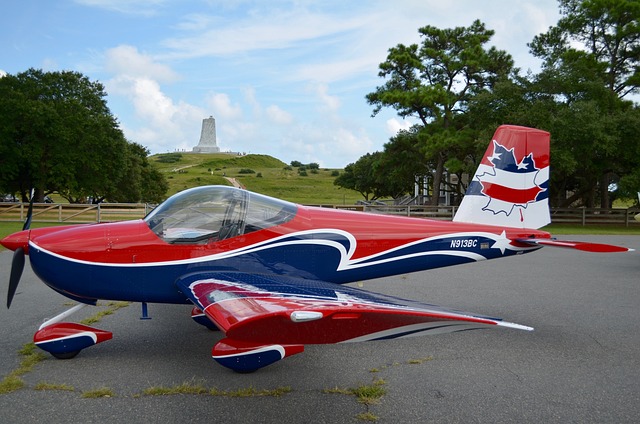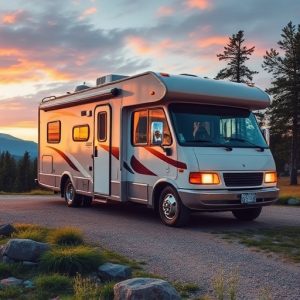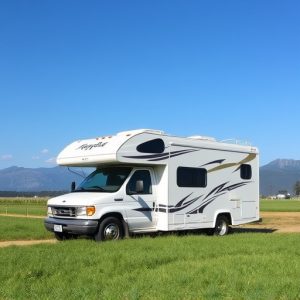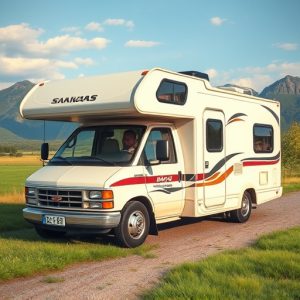Optimal RV Utilities Guide: Energy Efficiency, Water Management, & Climate-Smart Waste Solutions
To ensure a comfortable and energy-efficient RV journey, it's crucial to strategically positio…….

To ensure a comfortable and energy-efficient RV journey, it's crucial to strategically position your RV for optimal sunlight exposure for solar panels, invest in high-quality batteries with good storage capacity, and adopt smart habits like unplugging unused equipment, using LED lighting, and employing intelligent power strips. Proper insulation helps maintain comfort and reduce HVAC strain, while water conservation through low-flow fixtures and monitoring water pressure extends your off-grid camping trips. For climate control, ensure you have the right insulation, thermal curtains, space heaters for cold environments, and reflective roof coatings, awnings, and strategic use of air conditioners for warm climates. Waste management demands understanding and maintaining your RV's water and waste systems, with low-flow fixtures and sensors to conserve water and prevent issues. Regular maintenance and smart practices are essential for the longevity and performance of your RV's energy, water, and waste systems, contributing to a responsible and sustainable travel experience. Remember, RV Travel Tips can greatly enhance your RV journey by making it more comfortable, energy-efficient, and environmentally friendly.
Embarking on an RV adventure offers a blend of comfort and freedom, allowing travelers to explore diverse landscapes while enjoying modern amenities. To maintain this harmonious balance between adventure and lifestyle, effectively managing your RV’s utilities and systems is paramount. This comprehensive guide delves into the intricacies of RV utility management, ensuring that your journey is not only seamless but also sustainable. From optimizing energy usage to mastering water systems, understanding propane safety, and conserving water, each section provides valuable RV travel tips tailored for a variety of climates and environments. Whether you’re a novice RVer or an experienced traveler, this article equips you with the knowledge to troubleshoot issues, extend the lifespan of your batteries, and prevent emergencies through regular maintenance checks. Embrace eco-friendly practices and smart waste management techniques as you navigate the road less traveled. With these practical tips at your fingertips, you’re set to make the most of your RV travels, ensuring optimal performance and uninterrupted comfort throughout your journey.
- Efficient Energy Management: Strategies for Powering Your RV Optimally
- Mastering Water Systems: From Tank Maintenance to Conservation Techniques
- Navigating Heating and Cooling Needs in Different Climates
- Smart Waste Management Practices for RVers
Efficient Energy Management: Strategies for Powering Your RV Optimally

When embarking on an RV journey, mastering efficient energy management is paramount to ensure a comfortable and uninterrupted travel experience. To optimize power usage in your RV, it’s essential to understand the various energy sources available and how to harness them effectively. One of the primary strategies involves utilizing solar panels as an alternative energy source, which can be particularly beneficial when boondocking or dry camping. Positioning your RV so that solar panels receive ample sunlight for most part of the day is crucial for maximizing solar power generation. Additionally, investing in a high-quality battery with the capacity to store excess energy is advisable. This not only enhances your RV’s self-sufficiency but also provides a buffer against energy spikes during peak usage times.
RV travel tips also suggest conserving energy by adopting smart habits. For instance, unplug electrical equipment when not in use and use energy-efficient LED lighting throughout the RV. Smart power strips with individual switches can further aid in managing which appliances draw power at any given time, preventing unnecessary energy consumption. Insulating your RV to retain heat in winter and cold in summer can also reduce the workload on your heating, ventilation, and air conditioning (HVAC) systems, indirectly conserving energy. By implementing these strategies, you can ensure that your RV’s power systems perform optimally, enhancing your travel experience while being mindful of your energy footprint.
Mastering Water Systems: From Tank Maintenance to Conservation Techniques

When embarking on an RV travel adventure, understanding and managing your water systems is crucial for comfort and convenience during your journey. Regular maintenance of your freshwater tank ensures a reliable supply of clean water, which is essential for cooking, drinking, and personal hygiene. To maintain your tank, consider flushing it out upon arrival at a new destination to remove any sediment that may have settled over time. Additionally, use water treatment products as recommended to prevent the growth of algae or bacteria, which can compromise your water supply.
Water conservation techniques are equally important for RVers, especially when boondocking or dry camping. Implementing efficient usage practices, such as installing low-flow faucets and showerheads, can significantly reduce water waste. Also, be mindful of water pressure levels to prevent overuse; high pressure can lead to rapid depletion of your freshwater tank. Employing conservation techniques not only extends the duration of your RV trips without refilling but also aligns with responsible camping practices that protect our natural resources. By staying diligent in monitoring and managing your RV’s water systems, you can ensure a smooth and enjoyable travel experience. RV Travel Tips advocate for regular checks and proactive measures to maintain optimal water system performance throughout your travels.
Navigating Heating and Cooling Needs in Different Climates

When embarking on RV travel, managing your vehicle’s heating and cooling systems is paramount for comfort and safety, especially when transiting through diverse climates. In colder regions, RVers need to ensure their heating systems are in top condition. This typically involves insulating the RV properly to retain heat, utilizing thermal curtains, and employing space heaters as needed. It’s also wise to consider a reliable furnace that can handle the demands of cold weather, and always have propane tanks full to avoid running out of fuel during harsh conditions. Conversely, in warmer climates, managing the cooling system becomes a priority. RV travel tips suggest utilizing shades and awnings to block out sunlight, insulating the roof to prevent heat gain, and using air conditioners effectively. Opening windows or vents judiciously can also create cross-ventilation, which helps in dissipating heat without overworking the cooling system. Regardless of the climate, RVers must be mindful of their energy consumption, as resources are often limited in an RV setting. Regular maintenance checks on both heating and cooling systems before departure can prevent malfunctions that could leave travelers uncomfortably hot or cold. By following these RV travel tips for managing heating and cooling needs, RVers can enjoy optimal comfort and performance from their systems, making each journey more pleasant, no matter the weather outside.
Smart Waste Management Practices for RVers

When embarking on RV travel, smart waste management practices are paramount for an enjoyable and environmentally responsible journey. RVers must be adept at managing their RV’s waste systems, which include fresh water tanks, gray water tanks, and black water tanks. To maintain optimal performance of these systems, it’s crucial to understand their capacities and functions. Regular monitoring of tank levels prevents overflows and ensures that the RV’s living spaces remain clean and functional. Emptying tanks at designated dump stations is a routine task that RVers must perform diligently. Additionally, conserving water by using RV travel tips such as installing low-flow fixtures and utilizing full tank sensors can extend the time between necessary waste disposal activities. Implementing these smart practices not only extends the life of the RV’s waste management systems but also minimizes environmental impact, making for a more sustainable travel experience. Proper education on the specifics of each system and regular maintenance checks can safeguard against malfunctions and ensure that waste management remains a non-issue during your travels, allowing you to focus on the adventures ahead.
When embarking on an RV adventure, managing your vehicle’s utilities and systems is paramount for a comfortable and efficient journey. This article has provided RV travel tips tailored to optimize energy usage, manage water resources, address heating and cooling demands across various climates, and ensure prudent waste management practices. By implementing the strategies outlined in “Efficient Energy Management: Strategies for Powering Your RV Optimally,” “Mastering Water Systems: From Tank Maintenance to Conservation Techniques,” “Navigating Heating and Cooling Needs in Different Climates,” and “Smart Waste Management Practices for RVers,” you can enhance your RV experience significantly. Adopting these practices not only contributes to a more sustainable travel lifestyle but also ensures that your RV’s systems perform at their best, no matter where your travels take you. Happy exploring!







